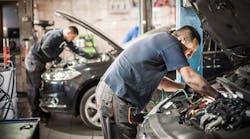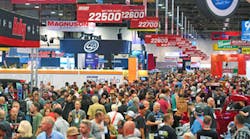Association president explains why Italy is the 'Armani' of the auto world.
Despite his stature in the industry, Cometti is humble, even gracious, and welcomes visitors to his factory with enthusiasm. The passion for his company Polin is inherent as he describes each machine in the factory like a proud parent introducing his children.
Cometti, who recently granted an exclusive interview with Aftermarket Business in Verona, also is the president of the Italian Automotive Service Equipment Manufacturers Association (AICA), Italy's prominent service equipment supplier association.
Polin, a 77-year-old collision repair equipment manufacturer, also does a considerable amount of business in the food industry, with industrial ovens that could house a car. These same "cooking" principles are adopted in the company's auto paint drying booths.
Doing business between the U.S. and Italy is prosperous, he notes, but it's not without its share of difficulties, one being discrepancies in the way labor is set up, along with regulations.
Cometti says that it's much easier visiting Italy as a tourist than as a businessperson, but if you find the right company and adhere to the proper standards, a business relationship with Italy can be prosperous.
Exporting is a large component of his and other Italian companies' business plans, and during his time in the collision repair industry, Cometti notes he has seen many advances.
For example, waterborne paint is compulsory. Also, manufacturers have developed safer glass for vehicle windows, and there's a limited amount of time techs can be inside the spray booth.
What is the current status of the European Block Exemption and what does it mean for the automotive sector in Italy? How does it –– and how will it –– affect Italy's business with other European countries? Does it have any effect on doing business with the United States?
This issue is being currently discussed. According to the European Commission there is no need to extend the BER, since the current regulation is good enough to ensure fair competition. In Italy, as well as in other EU countries (at least as far as we know) several associations do not see eye to eye with the Commission, so whether or not the BER gets extended remains to be seen.
What advice can you offer for those in the Italian auto industry who want to do business in the U.S.? What kinds of companies are the most likely to succeed? How about for those in the U.S. auto industry who want to do business in Italy? What, specifically, are the steps they should take to ensure their success in Italy?
The advice I can give to an Italian exporter is, it's a beautiful country if you know who you choose as your seller. The U.S. marketplace is huge and complex both from a technical and a regulatory point of view. Our first suggestion to an Italian company approaching it is to find a reliable partner who is familiar with this business system. This suggestion may be also good for U.S. companies who want to do business in Italy. Italy is a world leader in many segments of the automotive aftermarket industry; therefore Italian companies can create synergies with U.S. companies on several fronts.
What do you see as your biggest challenge(s) for doing business in Italy, Europe and around the world, including the United States?
Reliability is the key factor. Buyers may still consider price their top priority, yet quality and service make the difference in the long run. Companies with high market share have built a reputation for good products and superior customer service.
Is the automotive repair industry in Europe, particularly in Italy, facing some of the same economic challenges as the United States (customers deferring maintenance, fewer new cars purchased, etc.)?
Paradoxically, a decline in car sales should boost car maintenance, yet people tend to defer car maintenance in hard economic times. As a matter of fact, while cars are getting more and more reliable, car repairs are getting more and more complex, thus technical information, technician training and professional machinery are highly required. This means that operators in the auto repair business are being selected very carefully.
What are the largest obstacles/problems facing repair shops in Italy? How about collision centers?
The main problem for repair shops is to keep up with technological developments while preserving good profit margins. As far as collision centers go, the present economic crisis and increased safety awareness (the latter being a positive sign) combine to make this an unfavorable period for them.
From a manufacturer's point of view, what are the most significant advances in the Italian auto repair and collision industry segments? How about from AICA's point of view?
Italy boasts a strong tradition in production of auto repair and collision center equipment, with industrial districts featuring not only manufacturers of finished products, but also subcontractors and skilled labor. Thanks to this, several world- leading companies have their products manufactured in these districts.
As everyone knows, diesel is a prominent fuel source in Europe. What other types of fuel do you foresee gaining prominence in upcoming years? How are techs in your association preparing for these trends?
Gas-powered (LPG and LNG) vehicles are a huge hit in Italy at the moment, since both LPG and LNG are cheaper than gasoline and diesel and are also environmentally friendly. Moreover, low-pollution vehicles are allowed in car-free areas such as historical centers.
In the U.S. independent auto repair industry, training is held up as one of the most important aspects to running a successful business. How high a regard is technician training held in Italy?
Training will be the keystone to company success in the near future. This is why several operators are investing in auto repair training.
What does the "typical" Italian motorist expect from Italian service centers? Are they like American motorists who expect immediate turnaround of their vehicles even for complicated repair work? Can the Italian system distribution and repair network support such demands? What are Italian motorists' expectations for collision repair work?
Most Italian motorists "adore" their cars. Professional motorists consider quality repair work as important as turnaround, especially collision repair work, which is usually pricey.
Fuel prices in Europe have long been considered high when compared to U.S. prices. Are there any lessons you can share with the U.S. automotive industry on ways to cope with the drastic increase in U.S. fuel prices?
Much is being done to cut fuel costs in Italy. This is why diesel engines that are more fuel-efficient than gasoline engines are so popular in our country. And it looks like U.S. motorists are also getting more and more interested in fuel-efficient solutions.
Is Italy's diesel technology something that can help Americans with our fuel crisis? If so, how?
Diesel engines have improved tremendously in Italy, compared to a few years ago, when they used to be slow and noisy. Today's engine technology offers not only fuel-efficient performance, but also power and torque figures that have totally changed our image of diesel engines.
How has a more global business landscape changed the way the AICA offers services for its members?
Long before the term globalization became popular, AICA members were exporting about 70 percent of their output. We are therefore working on improving what we have been doing for years. And this is why the Autopromotec show has become the benchmark for the automotive equipment industry worldwide.
You have said before that Italy is the No. 1 manufacturer of service equipment in the world. What are some of the most innovative technologies that help technicians perform better work in the bays?
Our business involves constant developments including interaction with vehicle electronics, environmentally friendly solutions, keeping up with safety regulations and minimizing operator fatigue by maximizing productivity. In other words, there's a lot to do.



